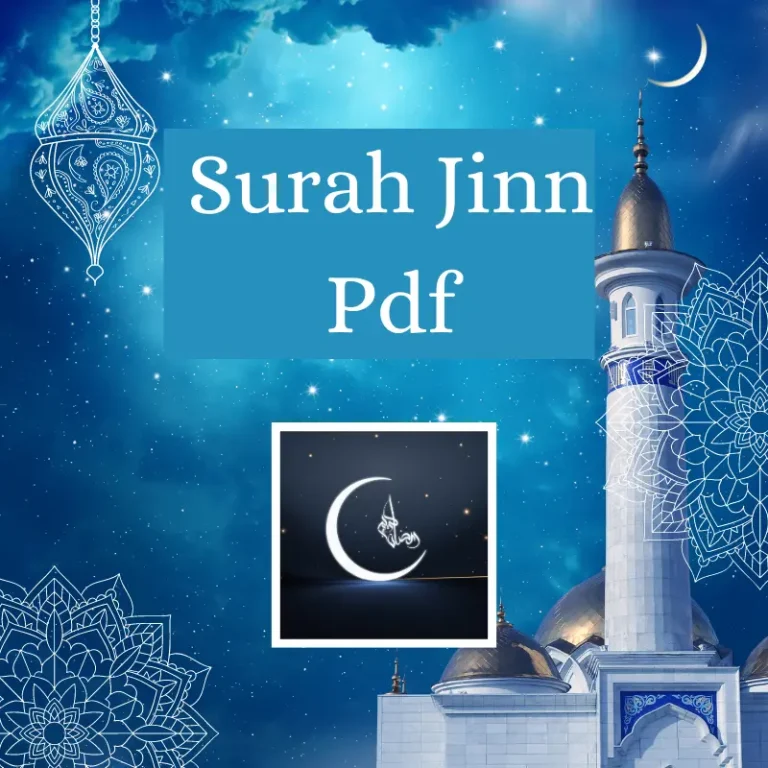Surah al Ghashiyah pdf
Surah al Ghashiyah pdf Download
Surah Al-Ghashiyah is the 88th chapter of the Quran, consisting of 26 verses. It is one of the shorter chapters of the Quran, and it is classified as a Meccan surah, meaning it was revealed to Prophet Muhammad (peace be upon him) during his early years in Mecca. Download Surah al Ghashiyah pdf from the above button.
The chapter’s name “Al-Ghashiyah” translates to “The Overwhelming Event” or “The Enveloping” in English, and it refers to the Day of Judgment when all people will be held accountable for their deeds.
The surah emphasizes the importance of belief in Allah and the message of Islam, warning of the consequences of rejecting the truth and following one’s own desires. It also describes the rewards of Paradise for the righteous and the punishment of Hell for the disbelievers.
Overall, Surah Al-Ghashiyah is a powerful reminder of the Day of Judgment and the importance of living a righteous life in preparation for it.
The Surah begins by drawing attention to the disbelievers’ dismissive attitudes toward the idea of resurrection. They mockingly inquire about the possibility of the dead being resurrected, failing to recognize the signs of creation all around them.
The Surah then redirects their attention to the earth’s changing states – from lifeless soil to vibrant gardens – as a reminder of the divine power of resurrection. This vivid imagery serves as an analogy for the resurrection of humankind after death.
The central theme of accountability dominates the subsequent verses. The Surah presents a scene of reckoning before the Lord of all worlds. It describes how every individual will be presented with a record of their deeds, wherein nothing is concealed. This transparency underscores the absolute fairness of divine judgment.
The Surah conveys that even the smallest of actions will be accounted for, emphasizing the precision of divine justice. This notion can be both comforting and daunting – comforting for those who have lived righteously and daunting for those who have been heedless of their actions.
The Surah then transitions to contrasting the destinies of those who lived righteous lives with those who chose to disregard their responsibilities. Those who embraced faith, engaged in virtuous acts, and believed in the unseen will find their abode in gardens of delight.
This description of paradise is rich in sensory and emotional details, capturing the essence of eternal bliss. In contrast, those who denied the truth and lived a life of self-indulgence will be consigned to the torment of Hell, a place of immense suffering and regret.
The Surah encourages believers to reflect on the signs present in the natural world and within themselves. These signs are meant to evoke gratitude, humility, and an acknowledgment of the Creator’s greatness. By contemplating the intricate design of the universe and their own existence, individuals are reminded of their inherent limitations and their dependence on a higher power. This reflection leads to a deeper understanding of the purpose of life and the transient nature of worldly pursuits.
Furthermore, the Surah emphasizes the importance of seeking knowledge and wisdom. It draws attention to the cycle of creation and destruction in the universe, highlighting the patterns that can be discerned by those who reflect. This call to contemplation encourages believers to engage with the world critically and thoughtfully, seeking to comprehend the underlying truths and meanings that lie beneath the surface.
Surah Al-Ghashiyah serves as a reminder of the ultimate truth of the Hereafter, awakening hearts and minds to the reality beyond the material realm. It underscores the concepts of accountability, resurrection, and divine justice, urging individuals to reflect on their actions and intentions. This Surah invites humanity to transcend their limited understanding and embrace the profound realities that lie ahead.
It encourages the cultivation of a humble and grateful attitude toward the Creator and the creation, reminding us that the pursuit of knowledge and the contemplation of existence lead to a deeper connection with the divine. Just as the Surah’s name suggests, the themes it explores are indeed overpowering, serving as a call to consciousness and spiritual awakening in the face of the inevitable Day of Judgment.







